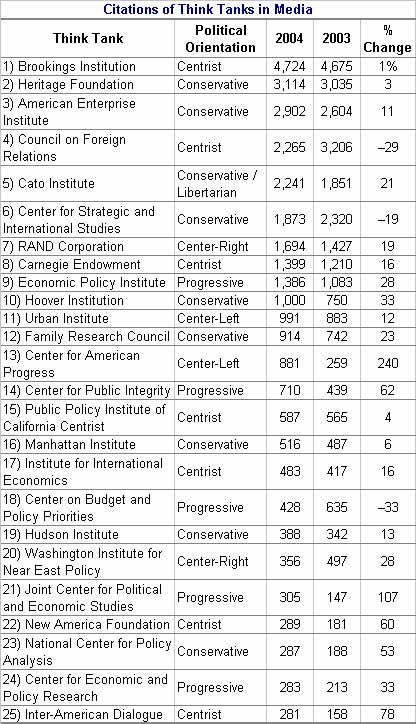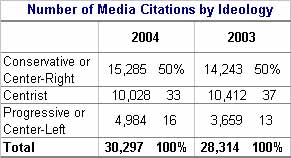Untitled Document
A study of media citations of think tanks in 2004—the 10th year of collecting
such data—finds that think tanks of the right and center still predominate,
despite a slight increase in citations of left-leaning think tanks.


The study counts citations of the 25 most prominent think tanks of right, center
and left, using the Nexis news media database. Citations are counted in what
Nexis designates to be major newspapers, as well as in Nexis’ transcripts
file, which includes the major broadcast and cable news outlets. Because stories
included in the Nexis database change over time, figures for previous years
are recalculated for comparison purposes rather than taken from previous editions
of the study.
Conservative or right-leaning think tanks garnered 50 percent of citations
among the 25 most-cited think tanks, the same percentage as last year, and near
their 10-year average of 51 percent of citations. Centrist think tanks declined
slightly this year, garnering 33 percent of the citations, compared to 37 percent
last year and 36 percent as their 10-year average. Progressive or left-leaning
think tanks had the greatest percentage increase this year, receiving 16 percent
of citations, up from last year’s 13 percent and their 10-year average
of 14 percent.
The usual suspects remained on top. The centrist Brookings Institution once
again led among all think tanks by a wide margin, and accounted for almost half
of all centrist citations. The Heritage Foundation regained the second spot
from the centrist Council on Foreign Relations, and was once again the most
prominently cited conservative think tank.
The conservative/libertarian Cato Institute, whose drop in citations since
2002 coincided with its opposition to the invasion of Iraq, saw the biggest
percentage gain among the leading think tanks. Cato’s fluctuations suggest
that conservative think tanks may pay a price in visibility for deviating from
the Republican Party line.
The Economic Policy Institute was the top-cited progressive think tank, seeing
a noticeable rise from 2003, a year when international issues dominated the
news. However, nearly half of the progressive gain in citations in 2004 came
from the Center for American Progress, a new think tank founded by financier
George Soros and headed by John Podesta, former Clinton chief-of-staff. CAP’s
politics are close to those of the Democratic Party mainstream; it favors sending
more NATO troops to Iraq rather than withdrawing U.S. forces, for instance (Iraq:
A Strategy for Progress, 5/5/05). As such, the group is distinctly to the right
of, say, the Institute for Policy Studies, which dropped out of the top 25 in
2004; so some of the slight gain in progressive think tank citations may have
resulted from moving toward the center.
Rube Goldberg, media critic
Despite the marginal gain on the left, the survey once again found that the
right receives about half of all think-tank citations, and that the center-to-right
spectrum dominates with a combined 84 percent of citations. Certainly little
support can be found in the media’s use of think tanks for the notion
of a “liberal bias.”
Not that some on the right aren’t willing to try. Academics Tim Groseclose
and Jeff Milyo got considerable attention for a paper they wrote called “A
Measure of Media Bias” (12/04), which deduced a “strong liberal
bias” from an analysis of news outlets’ use of “think tanks.”
(The groups the study looks at are actually a combination of think tanks and
advocacy groups.)
The report used a peculiar Rube Goldberg–like method to calculate media
bias from think tank citations: Taking the Americans for Democratic Action ratings
of congressional voting records as its yardstick, it assumed that media outlets
have ideologies similar to those of members of Congress who cited the same think
tanks that the media outlets did.
This approach is based on the problematic notion that politicians cite the
think tanks that they most agree with rather than the ones whose citation will
be the most politically effective—a problem the researchers acknowledge
when they attempt to explain away some curious anomalies that their method produces.
(The National Rifle Association comes out as a centrist group; the Rand Corporation
turns out to be left-leaning.)
If the authors truly wanted to rank media outlets on the ADA scale, the simpler
method would be to look at the ADA ratings of congressmembers quoted by those
news outlets. One suspects that the authors avoided this obvious approach because
the results would have been less to their liking: Studies in Extra! have repeatedly
found various media outlets quote Republicans more often than Democrats, by
ratios ranging from 3 to 2 on NPR (5–6/04) to 3 to 1 on nightly network
news (5–6/02) to a startling 5 to 1 on Fox News’ Special Report
(7–8/04). Fox News, according to Groseclose and Milyo’s method,
is a “centrist” news outlet.
Source: Nexis database on major newspaper and radio and TV transcripts. Political orientation is based on FAIR's evaluation of published work and media comments.
Note: The numbers for the Heritage Foundation were adjusted to correct for false positives. Approximately 21 percent of the time in 2004 and 22 percent of the time in 2003, the words "heritage foundation" appeared in Nexis without referring to the Washington-based think tank.

